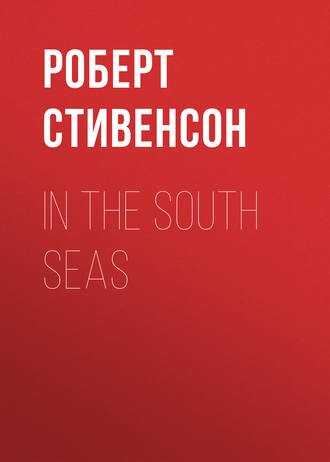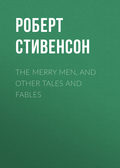
Роберт Льюис Стивенсон
In the South Seas
After dinner and supper in the cabin, a glass or two of ‘Hennetti’ – the genuine article this time, with the kirsch bouquet, – and five hours’ lounging on the trade-room counter, royalty embarked for home. Three tacks grounded the boat before the palace; the wives were carried ashore on the backs of vassals; Tembinok’ stepped on a railed platform like a steamer’s gangway, and was borne shoulder high through the shallows, up the beach, and by an inclined plane, paved with pebbles, to the glaring terrace where he dwells.
CHAPTER II – THE KING OF APEMAMA: FOUNDATION OF EQUATOR TOWN
Our first sight of Tembinok’ was a matter of concern, almost alarm, to my whole party. We had a favour to seek; we must approach in the proper courtly attitude of a suitor; and must either please him or fail in the main purpose of our voyage. It was our wish to land and live in Apemama, and see more near at hand the odd character of the man and the odd (or rather ancient) condition of his island. In all other isles of the South Seas a white man may land with his chest, and set up house for a lifetime, if he choose, and if he have the money or the trade; no hindrance is conceivable. But Apemama is a close island, lying there in the sea with closed doors; the king himself, like a vigilant officer, ready at the wicket to scrutinise and reject intrenching visitors. Hence the attraction of our enterprise; not merely because it was a little difficult, but because this social quarantine, a curiosity in itself, has been the preservative of others.
Tembinok’, like most tyrants, is a conservative; like many conservatives, he eagerly welcomes new ideas, and, except in the field of politics, leans to practical reform. When the missionaries came, professing a knowledge of the truth, he readily received them; attended their worship, acquired the accomplishment of public prayer, and made himself a student at their feet. It is thus – it is by the cultivation of similar passing chances – that he has learned to read, to write, to cipher, and to speak his queer, personal English, so different from ordinary ‘Beach de Mar,’ so much more obscure, expressive, and condensed. His education attended to, he found time to become critical of the new inmates. Like Nakaeia of Makin, he is an admirer of silence in the island; broods over it like a great ear; has spies who report daily; and had rather his subjects sang than talked. The service, and in particular the sermon, were thus sure to become offences: ‘Here, in my island, I ’peak,’ he once observed to me. ‘My chieps no ’peak – do what I talk.’ He looked at the missionary, and what did he see? ‘See Kanaka ’peak in a big outch!’ he cried, with a strong ring of sarcasm. Yet he endured the subversive spectacle, and might even have continued to endure it, had not a fresh point arisen. He looked again, to employ his own figure; and the Kanaka was no longer speaking, he was doing worse – he was building a copra-house. The king was touched in his chief interests; revenue and prerogative were threatened. He considered besides (and some think with him) that trade is incompatible with the missionary claims. ‘Tuppoti mitonary think “good man”: very good. Tuppoti he think “cobra”: no good. I send him away ship.’ Such was his abrupt history of the evangelist in Apemama.
Similar deportations are common: ‘I send him away ship’ is the epitaph of not a few, his majesty paying the exile’s fare to the next place of call. For instance, being passionately fond of European food, he has several times added to his household a white cook, and one after another these have been deported. They, on their side, swear they were not paid their wages; he, on his, that they robbed and swindled him beyond endurance: both perhaps justly. A more important case was that of an agent, despatched (as I heard the story) by a firm of merchants to worm his way into the king’s good graces, become, if possible, premier, and handle the copra in the interest of his employers. He obtained authority to land, practised his fascinations, was patiently listened to by Tembinok’, supposed himself on the highway to success; and behold! when the next ship touched at Apemama, the would-be premier was flung into a boat – had on board – his fare paid, and so good-bye. But it is needless to multiply examples; the proof of the pudding is in the eating. When we came to Apemama, of so many white men who have scrambled for a place in that rich market, one remained – a silent, sober, solitary, niggardly recluse, of whom the king remarks, ‘I think he good; he no ’peak.’
I was warned at the outset we might very well fail in our design: yet never dreamed of what proved to be the fact, that we should be left four-and-twenty hours in suspense and come within an ace of ultimate rejection. Captain Reid had primed himself; no sooner was the king on board, and the Hennetti question amicably settled, than he proceeded to express my request and give an abstract of my claims and virtues. The gammon about Queen Victoria’s son might do for Butaritari; it was out of the question here; and I now figured as ‘one of the Old Men of England,’ a person of deep knowledge, come expressly to visit Tembinok’s dominion, and eager to report upon it to the no less eager Queen Victoria. The king made no shadow of an answer, and presently began upon a different subject. We might have thought that he had not heard, or not understood; only that we found ourselves the subject of a constant study. As we sat at meals, he took us in series and fixed upon each, for near a minute at a time, the same hard and thoughtful stare. As he thus looked he seemed to forget himself, the subject and the company, and to become absorbed in the process of his thought; the look was wholly impersonal; I have seen the same in the eyes of portrait-painters. The counts upon which whites have been deported are mainly four: cheating Tembinok’, meddling overmuch with copra, which is the source of his wealth, and one of the sinews of his power, ’peaking, and political intrigue. I felt guiltless upon all; but how to show it? I would not have taken copra in a gift: how to express that quality by my dinner-table bearing? The rest of the party shared my innocence and my embarrassment. They shared also in my mortification when after two whole meal-times and the odd moments of an afternoon devoted to this reconnoitring, Tembinok’ took his leave in silence. Next morning, the same undisguised study, the same silence, was resumed; and the second day had come to its maturity before I was informed abruptly that I had stood the ordeal. ‘I look your eye. You good man. You no lie,’ said the king: a doubtful compliment to a writer of romance. Later he explained he did not quite judge by the eye only, but the mouth as well. ‘Tuppoti I see man,’ he explained. ‘I no tavvy good man, bad man. I look eye, look mouth. Then I tavvy. Look eye, look mouth,’ he repeated. And indeed in our case the mouth had the most to do with it, and it was by our talk that we gained admission to the island; the king promising himself (and I believe really amassing) a vast amount of useful knowledge ere we left.
The terms of our admission were as follows: We were to choose a site, and the king should there build us a town. His people should work for us, but the king only was to give them orders. One of his cooks should come daily to help mine, and to learn of him. In case our stores ran out, he would supply us, and be repaid on the return of the Equator. On the other hand, he was to come to meals with us when so inclined; when he stayed at home, a dish was to be sent him from our table; and I solemnly engaged to give his subjects no liquor or money (both of which they are forbidden to possess) and no tobacco, which they were to receive only from the royal hand. I think I remember to have protested against the stringency of this last article; at least, it was relaxed, and when a man worked for me I was allowed to give him a pipe of tobacco on the premises, but none to take away.
The site of Equator City – we named our city for the schooner – was soon chosen. The immediate shores of the lagoon are windy and blinding; Tembinok’ himself is glad to grope blue-spectacled on his terrace; and we fled the neighbourhood of the red conjunctiva, the suppurating eyeball, and the beggar who pursues and beseeches the passing foreigner for eye wash. Behind the town the country is diversified; here open, sandy, uneven, and dotted with dwarfish palms; here cut up with taro trenches, deep and shallow, and, according to the growth of the plants, presenting now the appearance of a sandy tannery, now of an alleyed and green garden. A path leads towards the sea, mounting abruptly to the main level of the island – twenty or even thirty feet, although Findlay gives five; and just hard by the top of the rise, where the coco-palms begin to be well grown, we found a grove of pandanus, and a piece of soil pleasantly covered with green underbush. A well was not far off under a rustic well-house; nearer still, in a sandy cup of the land, a pond where we might wash our clothes. The place was out of the wind, out of the sun, and out of sight of the village. It was shown to the king, and the town promised for the morrow.
The morrow came, Mr. Osbourne landed, found nothing done, and carried his complaint to Tembinok’. He heard it, rose, called for a Winchester, stepped without the royal palisade, and fired two shots in the air. A shot in the air is the first Apemama warning; it has the force of a proclamation in more loquacious countries; and his majesty remarked agreeably that it would make his labourers ‘mo’ bright.’ In less than thirty minutes, accordingly, the men had mustered, the work was begun, and we were told that we might bring our baggage when we pleased.
It was two in the afternoon ere the first boat was beached, and the long procession of chests and crates and sacks began to straggle through the sandy desert towards Equator Town. The grove of pandanus was practically a thing of the past. Fire surrounded and smoke rose in the green underbush. In a wide circuit the axes were still crashing. Those very advantages for which the place was chosen, it had been the king’s first idea to abolish; and in the midst of this devastation there stood already a good-sized maniap’ and a small closed house. A mat was spread near by for Tembinok’; here he sat superintending, in cardinal red, a pith helmet on his head, a meerschaum pipe in his mouth, a wife stretched at his back with custody of the matches and tobacco. Twenty or thirty feet in front of him the bulk of the workers squatted on the ground; some of the bush here survived and in this the commons sat nearly to their shoulders, and presented only an arc of brown faces, black heads, and attentive eyes fixed on his majesty. Long pauses reigned, during which the subjects stared and the king smoked. Then Tembinok’ would raise his voice and speak shrilly and briefly. There was never a response in words; but if the speech were jesting, there came by way of answer discreet, obsequious laughter – such laughter as we hear in schoolrooms; and if it were practical, the sudden uprising and departure of the squad. Twice they so disappeared, and returned with further elements of the city: a second house and a second maniap’. It was singular to spy, far off through the coco stems, the silent oncoming of the maniap’, at first (it seemed) swimming spontaneously in the air – but on a nearer view betraying under the eaves many score of moving naked legs. In all the affair servile obedience was no less remarkable than servile deliberation. The gang had here mustered by the note of a deadly weapon; the man who looked on was the unquestioned master of their lives; and except for civility, they bestirred themselves like so many American hotel clerks. The spectator was aware of an unobtrusive yet invincible inertia, at which the skipper of a trading dandy might have torn his hair.
Yet the work was accomplished. By dusk, when his majesty withdrew, the town was founded and complete, a new and ruder Amphion having called it from nothing with three cracks of a rifle. And the next morning the same conjurer obliged us with a further miracle: a mystic rampart fencing us, so that the path which ran by our doors became suddenly impassable, the inhabitants who had business across the isle must fetch a wide circuit, and we sat in the midst in a transparent privacy, seeing, seen, but unapproachable, like bees in a glass hive. The outward and visible sign of this glamour was no more than a few ragged coco-leaf garlands round the stems of the outlying palms; but its significance reposed on the tremendous sanction of the tapu and the guns of Tembinok’.
We made our first meal that night in the improvised city, where we were to stay two months, and which – so soon as we had done with it – was to vanish in a day as it appeared, its elements returning whence they came, the tapu raised, the traffic on the path resumed, the sun and the moon peering in vain between the palm-trees for the bygone work, the wind blowing over an empty site. Yet the place, which is now only an episode in some memories, seemed to have been built, and to be destined to endure, for years. It was a busy hamlet. One of the maniap’s we made our dining-room, one the kitchen. The houses we reserved for sleeping. They were on the admirable Apemama plan: out and away the best house in the South Seas; standing some three feet above the ground on posts; the sides of woven flaps, which can be raised to admit light and air, or lowered to shut out the wind and the rain: airy, healthy, clean, and watertight. We had a hen of a remarkable kind: almost unique in my experience, being a hen that occasionally laid eggs. Not far off, Mrs. Stevenson tended a garden of salad and shalots. The salad was devoured by the hen – which was her bane. The shalots were served out a leaf at a time, and welcomed and relished like peaches. Toddy and green cocoa-nuts were brought us daily. We once had a present of fish from the king, and once of a turtle. Sometimes we shot so-called plover along on the shore, sometimes wild chicken in the bush. The rest of our diet was from tins.
Our occupations were very various. While some of the party would be away sketching, Mr. Osbourne and I hammered away at a novel. We read Gibbon and Carlyle aloud; we blew on flageolets, we strummed on guitars; we took photographs by the light of the sun, the moon, and flash-powder; sometimes we played cards. Pot-hunting engaged a part of our leisure. I have myself passed afternoons in the exciting but innocuous pursuit of winged animals with a revolver; and it was fortunate there were better shots of the party, and fortunate the king could lend us a more suitable weapon, in the form of an excellent fowling-piece, or our spare diet had been sparer still.
Night was the time to see our city, after the moon was up, after the lamps were lighted, and so long as the fire sparkled in the cook-house. We suffered from a plague of flies and mosquitoes, comparable to that of Egypt; our dinner-table (lent, like all our furniture, by the king) must be enclosed in a tent of netting, our citadel and refuge; and this became all luminous, and bulged and beaconed under the eaves, like the globe of some monstrous lamp under the margin of its shade. Our cabins, the sides being propped at a variety of inclinations, spelled out strange, angular patterns of brightness. In his roofed and open kitchen, Ah Fu was to be seen by lamp and firelight, dabbling among pots. Over all, there fell in the season an extraordinary splendour of mellow moonshine. The sand sparkled as with the dust of diamonds; the stars had vanished. At intervals, a dusky night-bird, slow and low flying, passed in the colonnade of the tree stems and uttered a hoarse croaking cry.
CHAPTER III – THE KING OF APEMAMA: THE PALACE OF MANY WOMEN
The palace, or rather the ground which it includes, is several acres in extent. A terrace encloses it toward the lagoon; on the side of the land, a palisade with several gates. These are scarce intended for defence; a man, if he were strong, might easily pluck down the palisade; he need not be specially active to leap from the beach upon the terrace. There is no parade of guards, soldiers, or weapons; the armoury is under lock and key; and the only sentinels are certain inconspicuous old women lurking day and night before the gates. By day, these crones were often engaged in boiling syrup or the like household occupation; by night, they lay ambushed in the shadow or crouched along the palisade, filling the office of eunuchs to this harem, sole guards upon a tyrant life.
Female wardens made a fit outpost for this palace of many women. Of the number of the king’s wives I have no guess; and but a loose idea of their function. He himself displayed embarrassment when they were referred to as his wives, called them himself ‘my pamily,’ and explained they were his ‘cutcheons’ – cousins. We distinguished four of the crowd: the king’s mother; his sister, a grave, trenchant woman, with much of her brother’s intelligence; the queen proper, to whom (and to whom alone) my wife was formally presented; and the favourite of the hour, a pretty, graceful girl, who sat with the king daily, and once (when he shed tears) consoled him with caresses. I am assured that even with her his relations are platonic. In the background figured a multitude of ladies, the lean, the plump, and the elephantine, some in sacque frocks, some in the hairbreadth ridi; high-born and low, slave and mistress; from the queen to the scullion, from the favourite to the scraggy sentries at the palisade. Not all of these of course are of ‘my pamily,’ – many are mere attendants; yet a surprising number shared the responsibility of the king’s trust. These were key-bearers, treasurers, wardens of the armoury, the napery, and the stores. Each knew and did her part to admiration. Should anything be required – a particular gun, perhaps, or a particular bolt of stuff, – the right queen was summoned; she came bringing the right chest, opened it in the king’s presence, and displayed her charge in perfect preservation – the gun cleaned and oiled, the goods duly folded. Without delay or haste, and with the minimum of speech, the whole great establishment turned on wheels like a machine. Nowhere have I seen order more complete and pervasive. And yet I was always reminded of Norse tales of trolls and ogres who kept their hearts buried in the ground for the mere safety, and must confide the secret to their wives. For these weapons are the life of Tembinok’. He does not aim at popularity; but drives and braves his subjects, with a simplicity of domination which it is impossible not to admire, hard not to sympathise with. Should one out of so many prove faithless, should the armoury be secretly unlocked, should the crones have dozed by the palisade and the weapons find their way unseen into the village, revolution would be nearly certain, death the most probable result, and the spirit of the tyrant of Apemama flit to rejoin his predecessors of Mariki and Tapituea. Yet those whom he so trusts are all women, and all rivals.
There is indeed a ministry and staff of males: cook, steward, carpenter, and supercargoes: the hierarchy of a schooner. The spies, ‘his majesty’s daily papers,’ as we called them, come every morning to report, and go again. The cook and steward are concerned with the table only. The supercargoes, whose business it is to keep tally of the copra at three pounds a month and a percentage, are rarely in the palace; and two at least are in the other islands. The carpenter, indeed, shrewd and jolly old Rubam – query, Reuben? – promoted on my last visit to the greater dignity of governor, is daily present, altering, extending, embellishing, pursuing the endless series of the king’s inventions; and his majesty will sometimes pass an afternoon watching and talking with Rubam at his work. But the males are still outsiders; none seems to be armed, none is entrusted with a key; by dusk they are all usually departed from the palace; and the weight of the monarchy and of the monarch’s life reposes unshared on the women.
Here is a household unlike, indeed, to one of ours; more unlike still to the Oriental harem: that of an elderly childless man, his days menaced, dwelling alone amid a bevy of women of all ages, ranks, and relationships, – the mother, the sister, the cousin, the legitimate wife, the concubine, the favourite, the eldest born, and she of yesterday; he, in their midst, the only master, the only male, the sole dispenser of honours, clothes, and luxuries, the sole mark of multitudinous ambitions and desires. I doubt if you could find a man in Europe so bold as to attempt this piece of tact and government. And seemingly Tembinok’ himself had trouble in the beginning. I hear of him shooting at a wife for some levity on board a schooner. Another, on some more serious offence, he slew outright; he exposed her body in an open box, and (to make the warning more memorable) suffered it to putrefy before the palace gate. Doubtless his growing years have come to his assistance; for upon so large a scale it is more easy to play the father than the husband. And to-day, at least to the eye of a stranger, all seems to go smoothly, and the wives to be proud of their trust, proud of their rank, and proud of their cunning lord.
I conceived they made rather a hero of the man. A popular master in a girls’ school might, perhaps, offer a figure of his preponderating station. But then the master does not eat, sleep, live, and wash his dirty linen in the midst of his admirers; he escapes, he has a room of his own, he leads a private life; if he had nothing else, he has the holidays, and the more unhappy Tembinok’ is always on the stage and on the stretch.
In all my coming and going, I never heard him speak harshly or express the least displeasure. An extreme, rather heavy, benignity – the benignity of one sure to be obeyed – marked his demeanour; so that I was at times reminded of Samual Richardson in his circle of admiring women. The wives spoke up and seemed to volunteer opinions, like our wives at home – or, say, like doting but respectable aunts. Altogether, I conclude that he rules his seraglio much more by art than terror; and those who give a different account (and who have none of them enjoyed my opportunities of observation) perhaps failed to distinguish between degrees of rank, between ‘my pamily’ and the hangers-on, laundresses, and prostitutes.
A notable feature is the evening game of cards when lamps are set forth upon the terrace, and ‘I and my pamily’ play for tobacco by the hour. It is highly characteristic of Tembinok’ that he must invent a game for himself; highly characteristic of his worshipping household that they should swear by the absurd invention. It is founded on poker, played with the honours out of many packs, and inconceivably dreary. But I have a passion for all games, studied it, and am supposed to be the only white who ever fairly grasped its principle: a fact for which the wives (with whom I was not otherwise popular) admired me with acclamation. It was impossible to be deceived; this was a genuine feeling: they were proud of their private game, had been cut to the quick by the want of interest shown in it by others, and expanded under the flattery of my attention. Tembinok’ puts up a double stake, and receives in return two hands to choose from: a shallow artifice which the wives (in all these years) have not yet fathomed. He himself, when talking with me privately, made not the least secret that he was secure of winning; and it was thus he explained his recent liberality on board the Equator. He let the wives buy their own tobacco, which pleased them at the moment. He won it back at cards, which made him once more, and without fresh expense, that which he ought to be, – the sole fount of all indulgences. And he summed the matter up in that phrase with which he almost always concludes any account of his policy: ‘Mo’ betta.’
The palace compound is laid with broken coral, excruciating to the eyes and the bare feet, but exquisitely raked and weeded. A score or more of buildings lie in a sort of street along the palisade and scattered on the margin of the terrace; dwelling-houses for the wives and the attendants, storehouses for the king’s curios and treasures, spacious maniap’s for feast or council, some on pillars of wood, some on piers of masonry. One was still in hand, a new invention, the king’s latest born: a European frame-house built for coolness inside a lofty maniap’: its roof planked like a ship’s deck to be a raised, shady, and yet private promenade. It was here the king spent hours with Rubam; here I would sometimes join them; the place had a most singular appearance; and I must say I was greatly taken with the fancy, and joined with relish in the counsels of the architects.
Suppose we had business with his majesty by day: we strolled over the sand and by the dwarfish palms, exchanged a ‘Kõnamaori’ with the crone on duty, and entered the compound. The wide sheet of coral glared before us deserted; all having stowed themselves in dark canvas from the excess of room. I have gone to and fro in that labyrinth of a place, seeking the king; and the only breathing creature I could find was when I peered under the eaves of a maniap’, and saw the brawny body of one of the wives stretched on the floor, a naked Amazon plunged in noiseless slumber. If it were still the hour of the ‘morning papers’ the quest would be more easy, the half-dozen obsequious, sly dogs squatting on the ground outside a house, crammed as far as possible in its narrow shadow, and turning to the king a row of leering faces. Tembinok’ would be within, the flaps of the cabin raised, the trade blowing through, hearing their report. Like journalists nearer home, when the day’s news were scanty, these would make the more of it in words; and I have known one to fill up a barren morning with an imaginary conversation of two dogs. Sometimes the king deigns to laugh, sometimes to question or jest with them, his voice sounding shrilly from the cabin. By his side he may have the heir-apparent, Paul, his nephew and adopted son, six years old, stark naked, and a model of young human beauty. And there will always be the favourite and perhaps two other wives awake; four more lying supine under mats and whelmed in slumber. Or perhaps we came later, fell on a more private hour, and found Tembinok’ retired in the house with the favourite, an earthenware spittoon, a leaden inkpot, and a commercial ledger. In the last, lying on his belly, he writes from day to day the uneventful history of his reign; and when thus employed he betrayed a touch of fretfulness on interruption with which I was well able to sympathise. The royal annalist once read me a page or so, translating as he went; but the passage being genealogical, and the author boggling extremely in his version, I own I have been sometimes better entertained. Nor does he confine himself to prose, but touches the lyre, too, in his leisure moments, and passes for the chief bard of his kingdom, as he is its sole public character, leading architect, and only merchant.
His competence, however, does not reach to music; and his verses, when they are ready, are taught to a professional musician, who sets them and instructs the chorus. Asked what his songs were about, Tembinok’ replied, ‘Sweethearts and trees and the sea. Not all the same true, all the same lie.’ For a condensed view of lyrical poetry (except that he seems to have forgot the stars and flowers) this would be hard to mend. These multifarious occupations bespeak (in a native and an absolute prince) unusual activity of mind.
The palace court at noon is a spot to be remembered with awe, the visitor scrambling there, on the loose stones, through a splendid nightmare of light and heat; but the sweep of the wind delivers it from flies and mosquitoes; and with the set of sun it became heavenly. I remember it best on moonless nights. The air was like a bath of milk. Countless shining stars were overhead, the lagoon paved with them. Herds of wives squatted by companies on the gravel, softly chatting. Tembinok’ would doff his jacket, and sit bare and silent, perhaps meditating songs; the favourite usually by him, silent also. Meanwhile in the midst of the court, the palace lanterns were being lit and marshalled in rank upon the ground – six or eight square yards of them; a sight that gave one strange ideas of the number of ‘my pamily’: such a sight as may be seen about dusk in a corner of some great terminus at home. Presently these fared off into all corners of the precinct, lighting the last labours of the day, lighting one after another to their rest that prodigious company of women. A few lingered in the middle of the court for the card-party, and saw the honours shuffled and dealt, and Tembinok’ deliberating between his two; hands, and the queens losing their tobacco. Then these also were scattered and extinguished; and their place was taken by a great bonfire, the night-light of the palace. When this was no more, smaller fires burned likewise at the gates. These were tended by the crones, unseen, unsleeping – not always unheard. Should any approach in the dark hours, a guarded alert made the circuit of the palisade; each sentry signalled her neighbour with a stone; the rattle of falling pebbles passed and died away; and the wardens of Tembinok’ crouched in their places silent as before.







